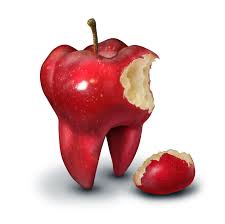Good oral hygiene is important for healthy teeth and gums. Here are a few simple steps that can decrease the risk of tooth decay and other dental problems:
Brush teeth at least twice a day and floss at least once daily.
Eat a well-balanced diet.
Use toothpaste containing fluoride to help strengthen tooth enamel.
How does tooth decay happen?
Every time you eat, you create an environment, which promotes oral bacteria development. These bacteria then produce acids, which can decay teeth; this is why it is important to brush your teeth after meals. Untreated tooth decay can cause infection, extreme pain, and/or the loss of teeth. The beginning stages of tooth decay are unnoticeable, but if left untreated will progress deeper into the tooth. There are many reasons for tooth decay: poor oral hygiene practices, enamel issues, poor diet, etc.
How your diet can affect your dental hygiene
Poor nutrition does not directly affect oral hygiene. However, poor nutrition can affect the immune system, which makes you more susceptible to disease. It is important to eat foods from all the five major food groups. The elimination of food groups can lead to vitamin or mineral deficiencies, which can affect the strength of teeth.
Foods that cling to teeth can promote tooth decay. As you snack throughout the day, try to avoid soft, sweet, and sticky foods, which can decay tooth enamel. Foods such as nuts, raw vegetables, plain yogurt, and hard cheese are considered healthy dental foods.
Visiting the dentist on a regular schedule for routine cleaning will prevent cavities from occurring and growing. The dentist will check your mouth for any signs of tooth decay any issues will be addressed quickly, and preventive measures will be taken to avoid any future decay. To schedule your next appointment, contact us.
